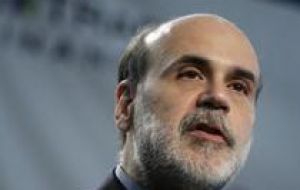MercoPress. South Atlantic News Agency
US inflation surprises with 0.2% increase in January
 U.S. Federal Reserve chairman Ben Bernanke
U.S. Federal Reserve chairman Ben Bernanke United States consumer prices increased 0.2% in January pushed by rising medical and food costs despite a fall in energy prices, reports the US Department of Labor
The increase was below December's 0.4% rise but above the 0.1% forecast. Core inflation, which excludes food and energy, rose by 0.3% for the month. In recent months, rising energy prices have been a key inflationary factor, but last month, energy prices actually fell by 1.5%. Petrol prices in January dropped 3%, leaving them 32% lower than at their high point in July 2006, when oil peaked at about 78 dollars a barrel. However, this drop was not enough to counter higher food prices, as dairy products, fruit and vegetables all became more expensive. Overall, food costs rose by 0.7%, the biggest increase since 2005. Medical care costs went up by 0.8%, the sharpest rise in 15 years. The latest figure brought the annual rate of consumer price inflation to 2.1% for the 12 months to January. Federal Reserve chairman Ben Bernanke recently indicated in testimony to Congress that inflation was heading lower and would gradually fall over the next two years. Seeking to subdue inflation without hurting growth, the Fed's policy so far has been to hold the benchmark rate at 5.25% the past five meetings. Bernanke told lawmakers last week that lower prices for oil, commodities and rent will help push down the preferred inflation gauge to within his comfort zone next year. "If inflation becomes higher for some reason, then the Federal Reserve would have to respond to it'' Bernanke said in response to questions from House Financial Services Committee Chairman Barney Frank of Massachusetts. One measure, the personal consumption expenditures index minus food and energy, the Fed's preferred inflation gauge, rose 2.2% in December from a year ago. Minutes of the last Federal Reserve meeting show that interest rates were left on hold because of uncertainty about the future path of inflation. "Participants did not yet see a downward trend in core inflation as definitively established," notes said. While there had been some good news on the economy - such as strong growth, members of the group remained concerned about the outlook for inflation. "Incoming data had suggested some improvement in core inflation, and a further gradual decline was seen as the most likely outcome, fostered in part by the continued stability of inflation expectations. However, participants did not yet see a downtrend in core inflation as definitively established," the minutes stated. Minutes also raised concerns about the slowdown in the US housing sector. "The ongoing contraction in the housing sector and the potential for spillovers to other sectors remained notable downside risks to economic activity".




Top Comments
Disclaimer & comment rulesCommenting for this story is now closed.
If you have a Facebook account, become a fan and comment on our Facebook Page!